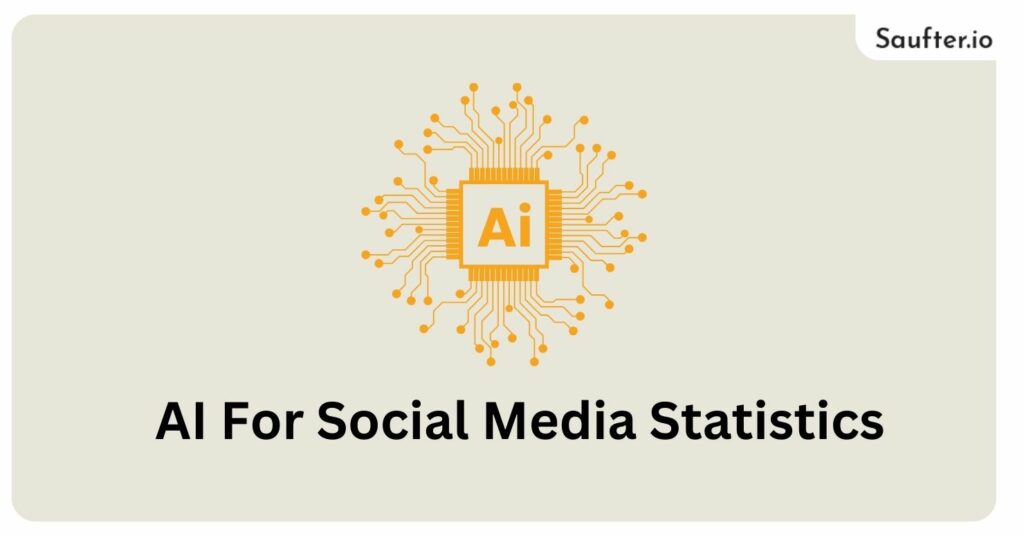Last Updated: October 2025
Artificial intelligence (AI) is becoming a powerful force in social media, transforming user experiences, enhancing content generation, and boosting revenue. As of 2024, AI for social media is crucial in automating content creation, optimizing advertisements, and personalizing user engagement. AI-driven algorithms now power over 80% of all social media content recommendations, significantly improving user retention rates.
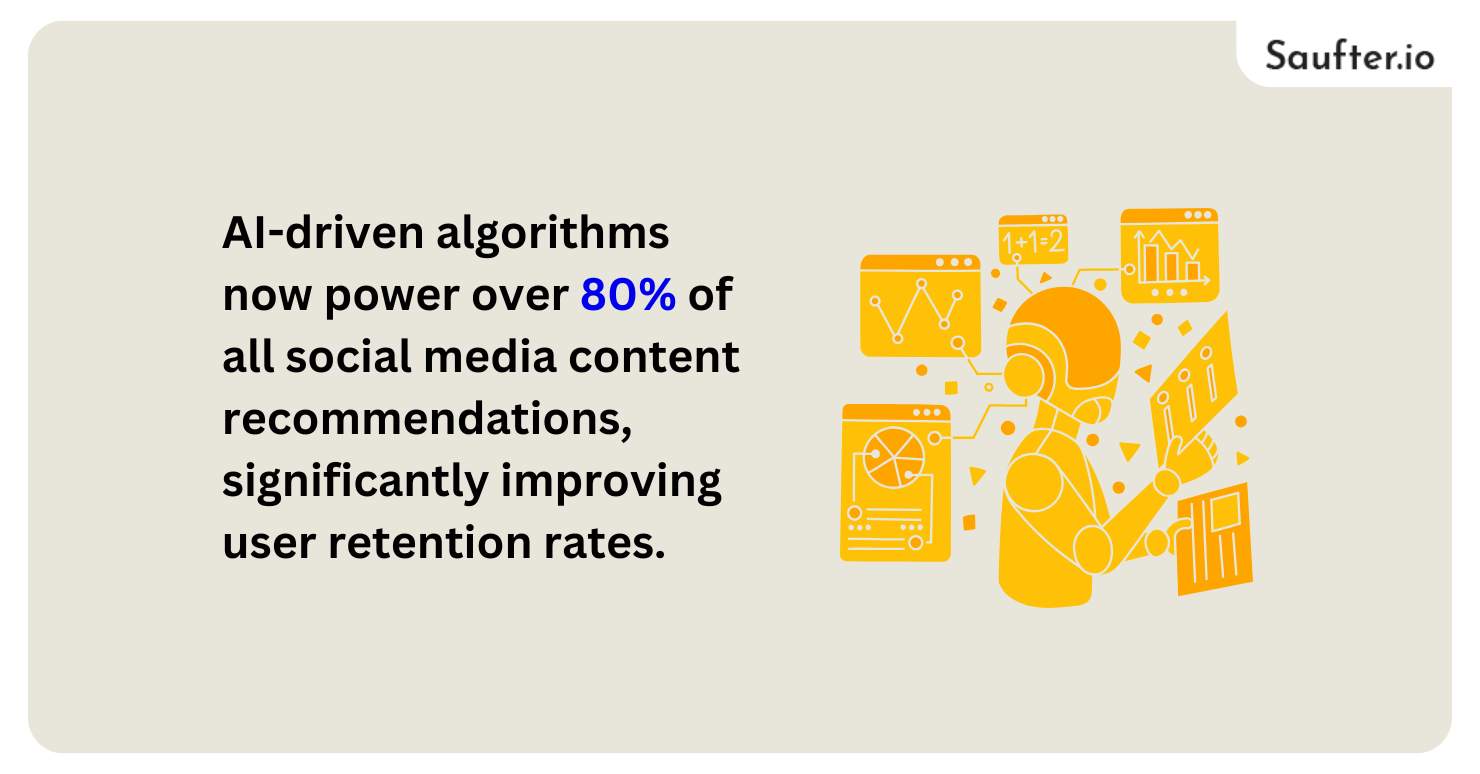
This blog comprehensively analyzes AI’s impact on social media, with detailed statistics on user demographics, country-based usage, and the financial landscape shaped by AI innovations.
Table of Contents
- Introduction
- Global User Demographics
- AI and Regional Social Media Usage
- Financial Growth Driven by AI in Social Media
- AI-Driven Marketing Trends
- Challenges with AI in Social Media
- Future of AI in Social Media
- AI-Driven Content Creation
- AI Influencers: The Future of Marketing
- Advanced Audience Segmentation with AI
- Conclusion
Top Key Statistics for AI in Social Media (2024)
- As of 2024, there are 5.17 billion global social media users, accounting for 63.7% of the world’s population.
- Over 80% of social media content recommendations are powered by AI, significantly improving user retention rates.
- On Instagram, 50.6% of users are male and 49.4% are female, with males aged 18-34 making up the largest demographic.
- Northern Europe has the highest social media penetration at 80.2%, while North America has 82% penetration, with high AI adoption in both regions.
- The AI-driven social media market is projected to reach $12 billion by 2031, up from $2.1 billion in 2021.
- Businesses using AI for social media report 15-25% improvements in engagement rates, contributing to higher revenues.
- AI in Influencer Marketing: AI is expected to account for 35% of total influencer marketing investments in 2024, driven by campaign optimization and influencer identification.
Global User Demographics
Global Social Media Users and AI Integration
As of 2024, the global social media user base is approximately 5.17 billion, accounting for 63.7% of the global population. The adoption of AI for social media posts, content personalization, and customer service automation is widespread. Companies are increasingly turning to AI-driven tools to analyze user behavior and optimize their engagement strategies, leading to improved interaction and monetization on platforms like Instagram, Facebook, and TikTok.
Year | Global Social Media Users (Billion) | Global Population (%) |
2022 | 4.7 | 59.5% |
2023 | 5.0 | 62.0% |
2024 | 5.17 | 63.7% |
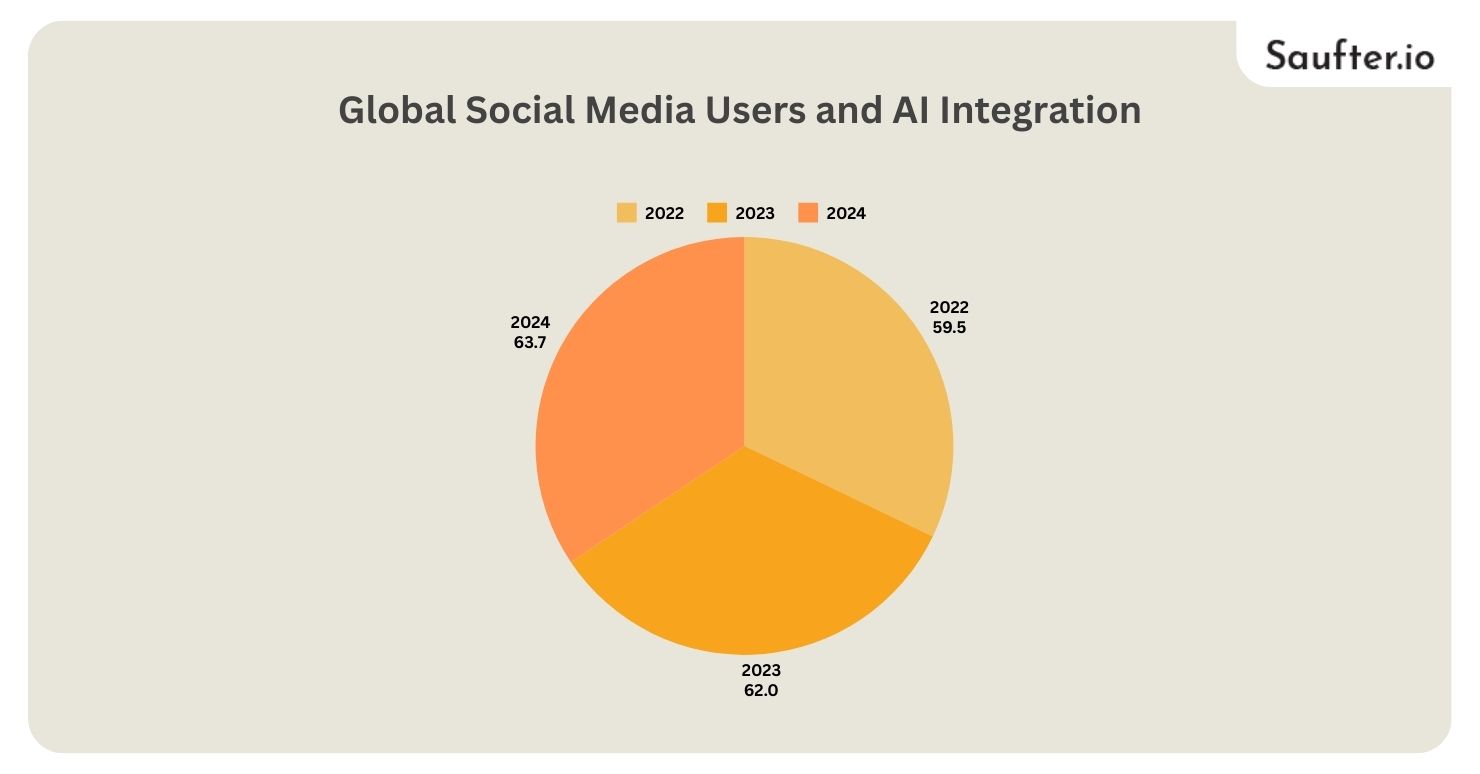
Gender Distribution and AI Content Engagement
AI-powered platforms such as Instagram show almost equal gender distribution, with 50.6% male and 49.4% female users. Men aged 18-34 constitute the largest segment, making AI algorithms particularly valuable for targeting content and advertisements at this audience. Moreover, 67.8% of Instagram users are under 35, indicating a young, tech-savvy audience more likely to engage with AI-generated content.
Platform | Male Users (%) | Female Users (%) | Largest Age Group |
50.6 | 49.4 | Males aged 18-34 | |
TikTok | 43.7 | 56.3 | Females aged 18-24 |
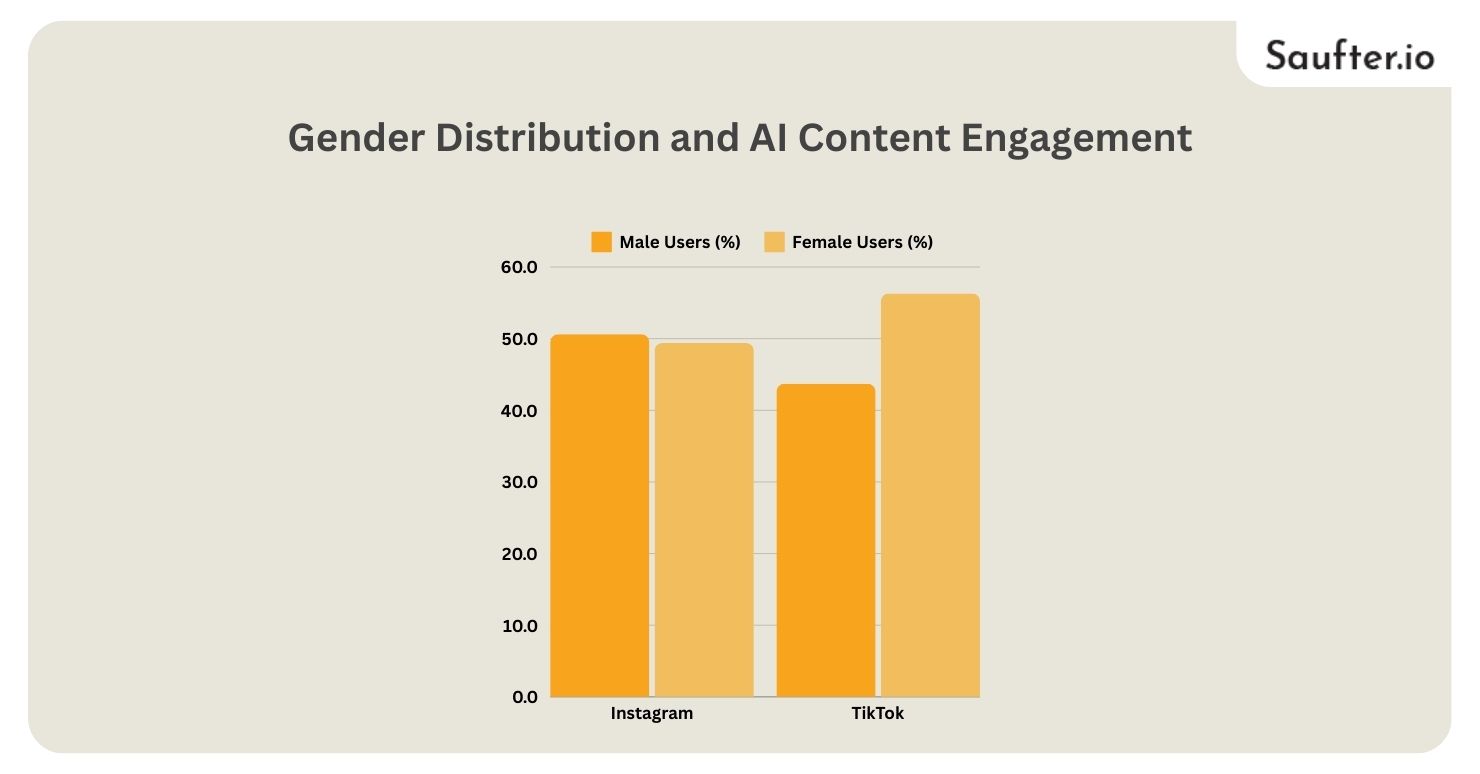
Age-Based Usage Insights
AI in social media plays a pivotal role in shaping experiences for younger users. The largest age group on social media, 25-34 years, comprises 29.9% of global users, while 18-24 year-olds form 23.5%. These younger users are especially drawn to AI-enhanced content, such as customized feeds, targeted ads, and interactive experiences, which greatly increase engagement.
Age Group | Percentage of Users (%) | AI-Driven Engagement Focus |
18-24 | 23.5 | Personalized content, ads |
25-34 | 29.9 | AI for social media marketing |
35-44 | 19.7 | Content recommendations |
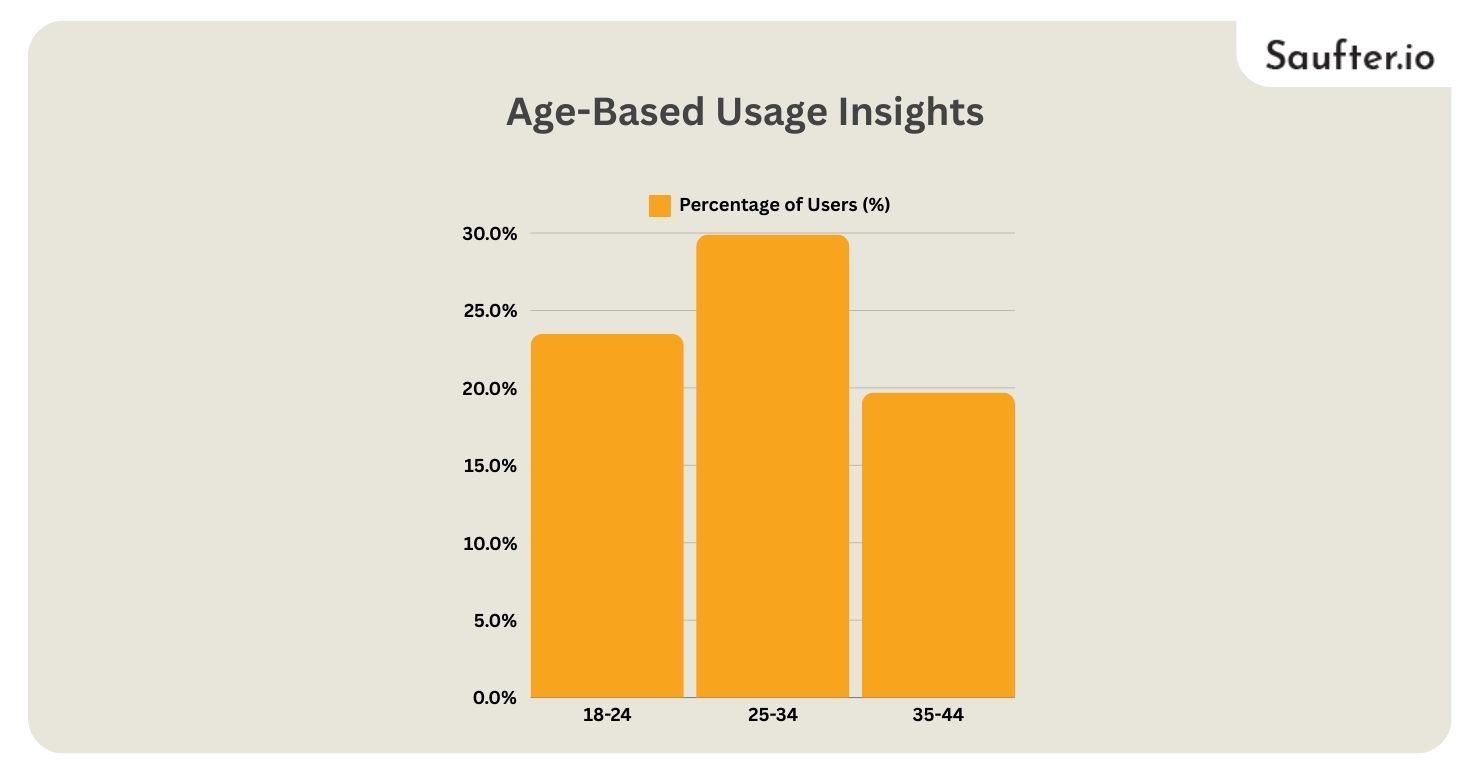
AI and Regional Social Media Usage
AI Penetration by Region
Social media penetration is high across various regions, particularly in Northern Europe, where 80.2% of the population actively uses social media. In the U.S., 82% of people aged 12 and older use social media, leveraging AI for personalized recommendations and marketing. AI in social media marketing strategies is increasingly influential in both Europe and North America, where businesses are tapping into AI to enhance consumer engagement and optimize ad spend.
Region | Social Media Penetration (%) | AI Adoption in Marketing |
Northern Europe | 80.2 | High |
Western Europe | 78.2 | High |
Eastern Asia | 74.9 | Moderate |
North America | 82 | High |
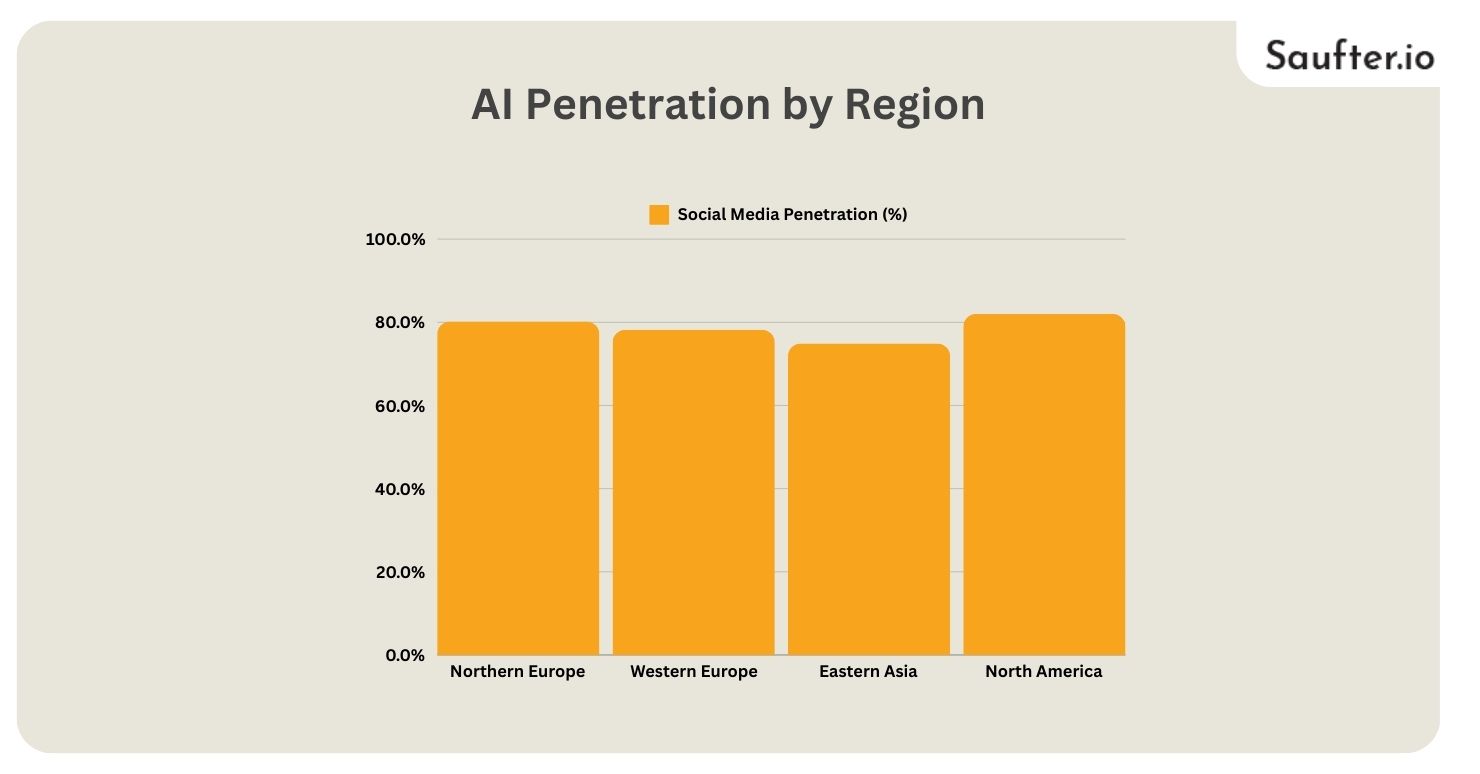
U.S. Social Media and AI
In the United States, with approximately 235 million social media users, AI technologies play a critical role in shaping ad targeting and content generation. AI-driven insights help companies in the U.S. increase customer engagement by tailoring posts and advertisements based on user behavior.
Country | Social Media Users (Million) | AI Usage in Marketing |
USA | 235 | Widely Adopted |
China | 987 | Growing |
India | 658 | Rapid Adoption |
Also Read –Perplexity Revenue and Statistics
Financial Growth Driven by AI in Social Media
AI Market Size for Social Media
The AI in the social media market is projected to grow exponentially, reaching $12 billion by 2031. This growth is fueled by the integration of machine learning, predictive analytics, and automation tools into marketing strategies. AI has significantly improved advertising efficiency, enhanced customer interaction, and increased brand visibility across all major platforms.
Year | AI in the Social Media Market (Billion USD) |
2021 | 2.1 |
2025 | 7.5 |
2031 | 12.0 |
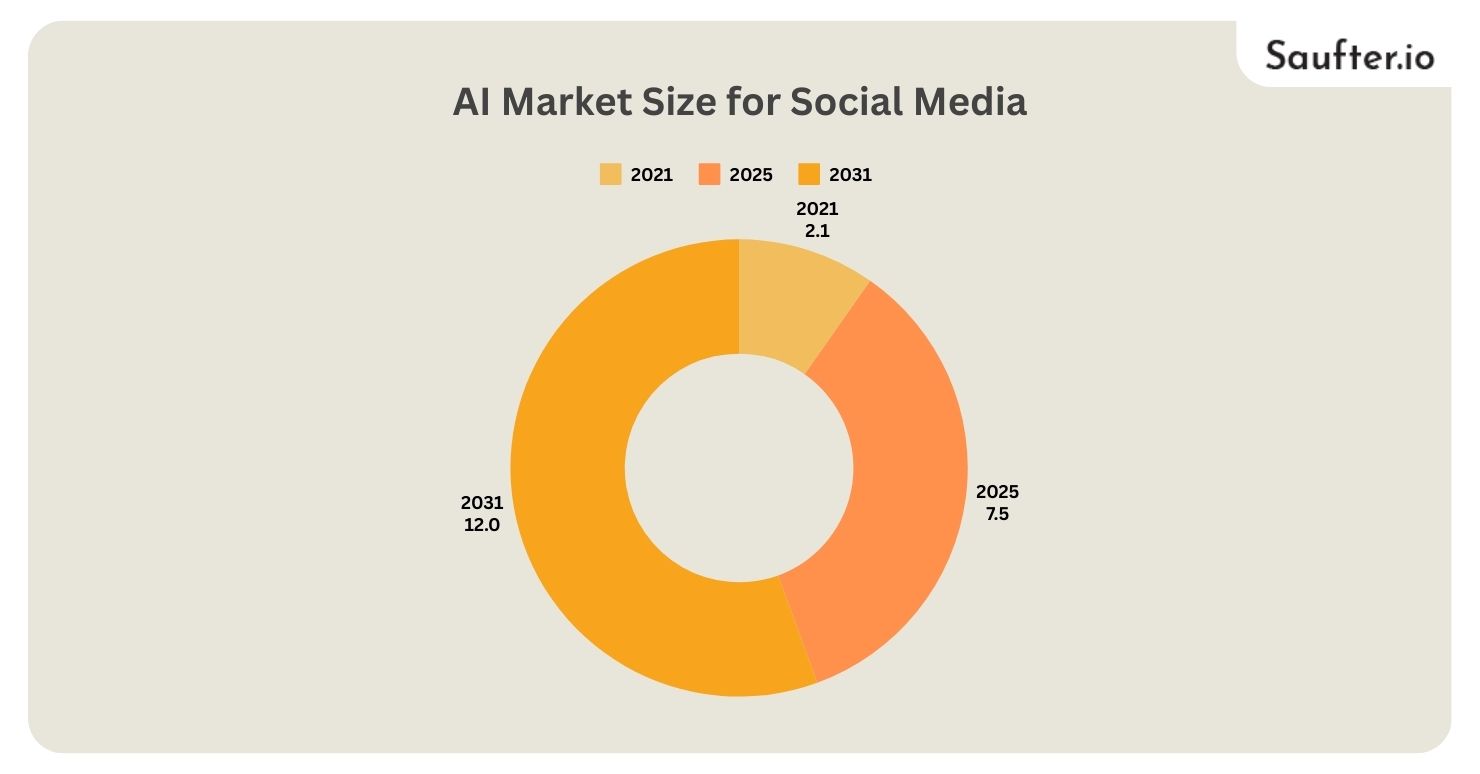
Revenue Generation through AI Tools
Companies using AI tools report notable revenue increases, primarily through ad optimization and targeted content. AI tools help automate repetitive tasks, such as scheduling social media posts, providing real-time performance analytics, and optimizing ad spend. Businesses employing AI for social media content generation report 15-25% improvements in engagement rates, ultimately leading to higher revenue.
AI Tool | Revenue Growth (%) |
AI for Ad Targeting | 25% |
AI for Content Generation | 20% |
AI for Influencer Marketing | 15% |
AI-Driven Marketing Trends
AI and Influencer Marketing
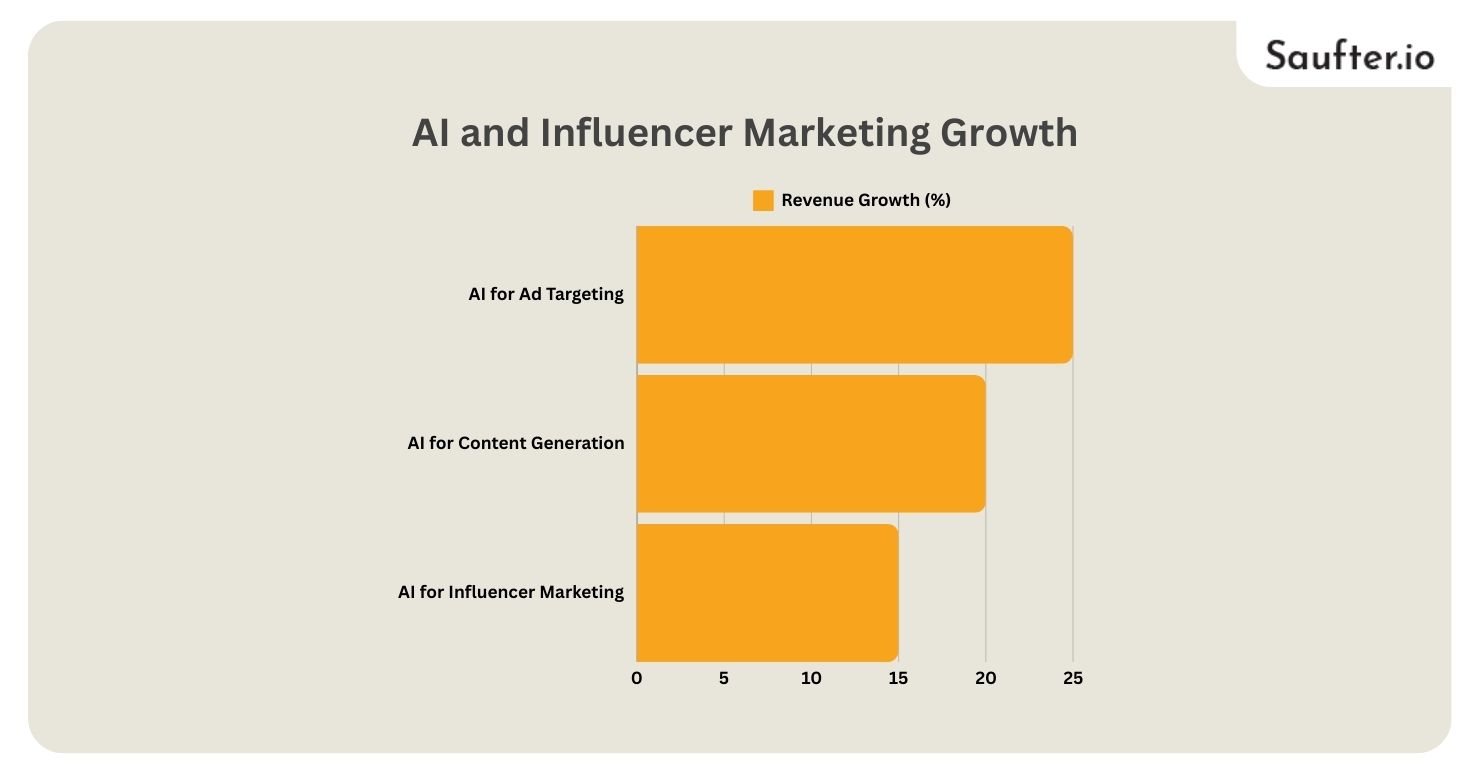
Influencer marketing is highly dependent on AI-powered analytics to identify the right influencers and track the success of campaigns. By automating these processes, brands can quickly and efficiently optimize their marketing strategies. In 2024, AI for influencer marketing is expected to account for 35% of total influencer marketing investments.
Marketing Strategy | AI Contribution to Growth (%) |
Influencer Identification | 25% |
Campaign Optimization | 35% |
ROI Tracking | 40% |
Personalization through AI
Personalization is a key AI feature on social media platforms. AI analyzes vast amounts of user data to create tailored recommendations, increasing the time users spend on platforms and improving ad targeting. For instance, platforms like Facebook and Instagram use AI to personalize users’ feeds based on their activity and preferences.
Personalization Feature | Impact on Engagement (%) |
AI-Generated Recommendations | 30% Increase in Interaction |
Targeted Advertisements | 20% Increase in Click-Through Rate |
Challenges with AI in Social Media
Trust Issues with AI-Generated Content
Despite the numerous advantages of AI, trust remains a concern, especially among younger generations. Only 21% of Gen Z trust AI-generated content, with many preferring human-curated content. This trend indicates that while AI can optimize content production and targeting, balancing AI with human input is essential to retaining trust.
Generation | Trust in AI Content (%) | Preference for Human Input |
Gen Z | 21% | High |
Millennials | 35% | Moderate |
Gen X | 45% | Low |
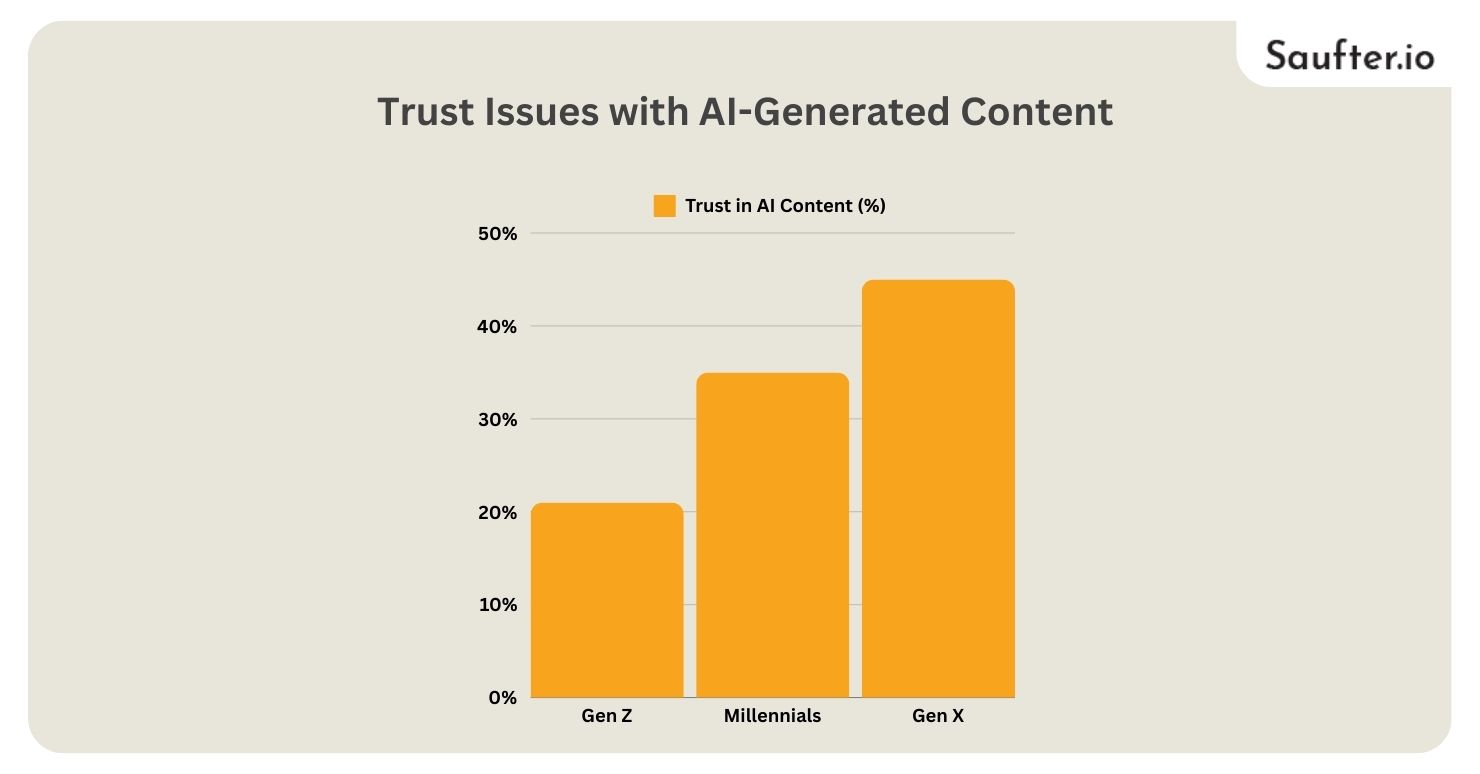
Future of AI in Social Media
AI’s Role in Predictive Analytics
As AI technology advances, predictive analytics will play an even larger role in social media strategies. AI will allow businesses to predict user behavior, understand trends, and make proactive adjustments to their marketing campaigns, leading to more efficient resource allocation and higher ROI.
AI Feature | Impact on Marketing |
Predictive Analytics | Higher ROI |
Automated Customer Interaction | Reduced Costs |
Future Growth Prospects
Looking ahead, AI’s role in content creation, ad optimization, and customer engagement will continue to expand. Businesses that adopt AI early are likely to stay ahead of the competition, benefiting from enhanced targeting and increased revenue.
Year | AI in Social Media Market Growth (%) |
2024 | 18% |
2025 | 25% |
2030 | 35% |
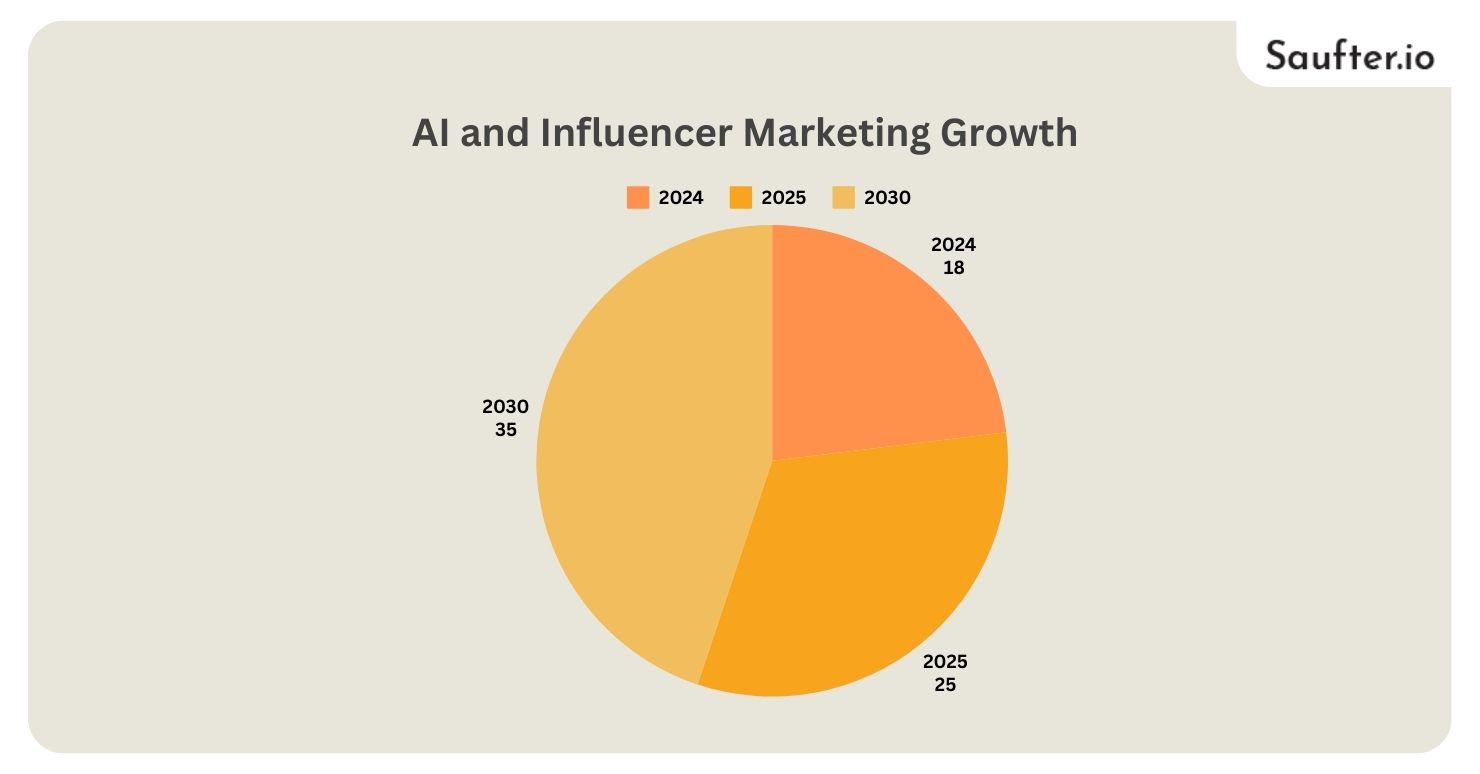
AI-Driven Content Creation
The rise of AI tools for content creation is revolutionizing how marketers approach social media. In 2024, 75% of marketers plan to use AI-driven tools for text revision and content generation, reflecting a 103% increase from the previous year. Tools like Jasper.ai and Writesonic help marketers generate high-quality content, including social media posts, captions, blogs, and even videos, in minutes. These tools enable streamlined workflows, improve content personalization, and optimize social media performance metrics AI.
AI tools can also analyze social media analytics AI, ensuring that the generated content resonates with specific audience segments. Furthermore, Generative AI for content marketing allows for better-targeted ad copy, reducing the time spent on manual content creation while enhancing personalization.
Year | Marketers Using AI for Content Creation (%) | Increase |
2023 | 37% | – |
2024 | 75% | 103% |
With AI in social media marketing set to dominate content creation trends, marketers now can produce content that is hyper-personalized to user preferences while also being highly scalable.
AI Influencers: The Future of Marketing
The future of influencer marketing AI lies in virtual and AI-generated influencers like Rozy.gram, a South Korean virtual influencer with over 130,000 followers. These influencers are designed to appeal to specific demographics, offering brands consistent engagement and messaging without the unpredictability of real human influencers.
Brands are increasingly collaborating with AI influencers for product placements, social media campaigns, and personalized recommendations. Influencers like Lil Miquela, who has over 3 million followers, are setting a new trend in AI-driven social media strategies, offering a powerful avenue for brands to engage with younger audiences on platforms like Instagram and TikTok.
AI for social media engagement also makes it easier to measure the success of campaigns through automated social media analytics AI tools. These tools track key performance metrics such as follower growth, post-engagement rates, and click-throughs, providing actionable insights for optimizing future campaigns.
AI Influencer | Followers | Engagement Rate (%) | Key Brand Collaborations |
Rozy.gram | 130,000+ | 15% | Hyundai, Lotte |
Lil Miquela | 3 million+ | 20% | Prada, Calvin Klein |
As AI-driven social media strategies continue to evolve, brands are leveraging these influencers for improved reach and engagement across key social platforms.
Advanced Audience Segmentation with AI
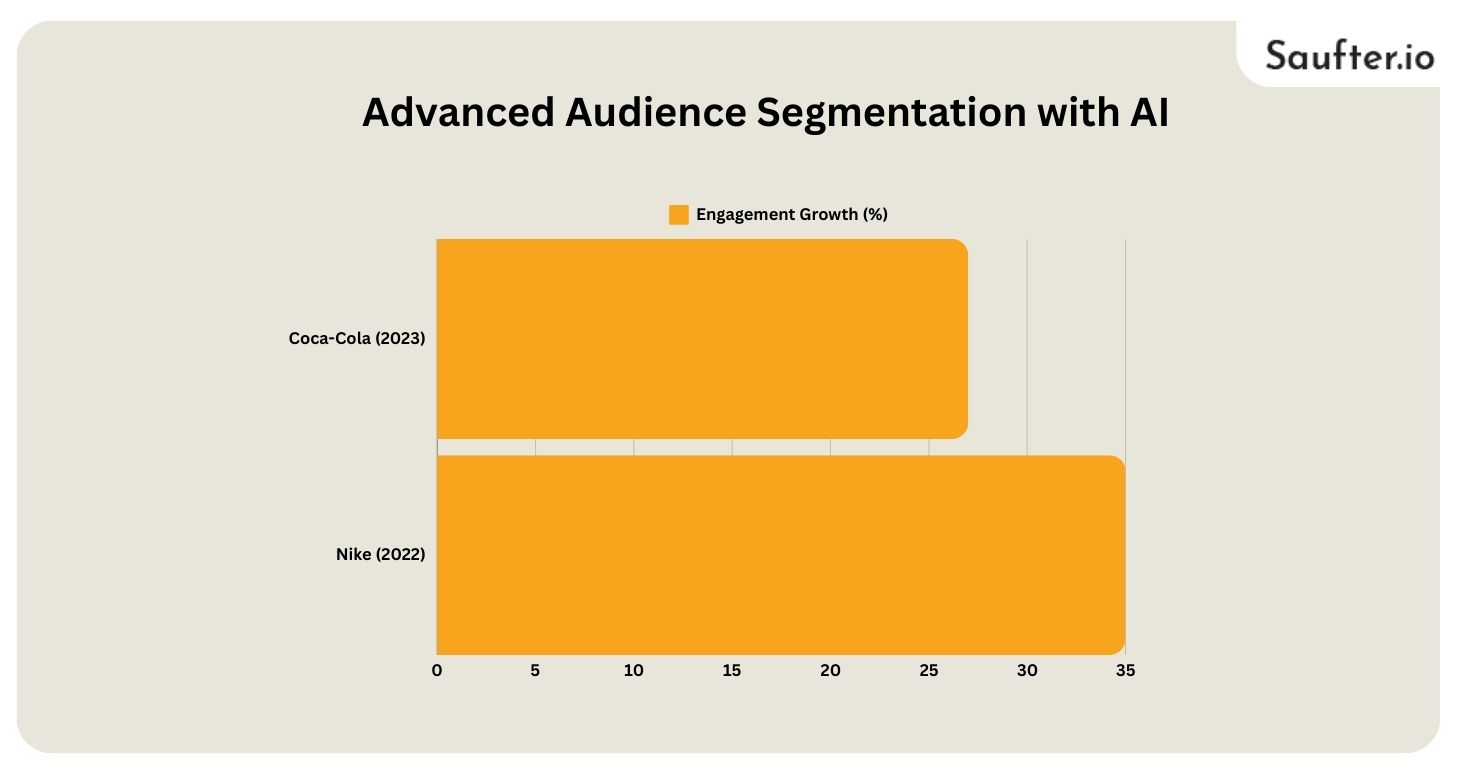
AI audience segmentation is transforming how marketers target consumers on social media by analyzing vast amounts of user data, such as browsing habits, content preferences, and engagement history. This allows brands to deliver highly personalized content that resonates with specific audience segments.
In 2024, predictive analytics in social media is expected to increase engagement by 35-40% for brands that use advanced segmentation techniques. AI-driven tools help brands automatically segment their audiences based on behavior patterns, demographics, and previous interactions. This results in more effective AI content personalization, leading to higher customer retention and engagement.
For example, Coca-Cola’s AI-driven social media strategies utilized advanced segmentation to target users with personalized messages. This campaign resulted in a 27% increase in customer engagement, showcasing how powerful AI can be in increasing social media success.
Brand | Segmentation Method | Engagement Growth (%) |
Coca-Cola (2023) | AI-Powered Audience Segmentation | 27% |
Nike (2022) | Behavioral Segmentation | 35% |
The future of AI in social media lies in creating deeply personalized user experiences through precise segmentation, ultimately increasing customer satisfaction and brand loyalty. Social media automation tools 2024, like Hootsuite and Sprout Social, are also integrating AI for enhanced audience insights, ensuring marketers can deliver the right message to the right audience at the right time.
Conclusion
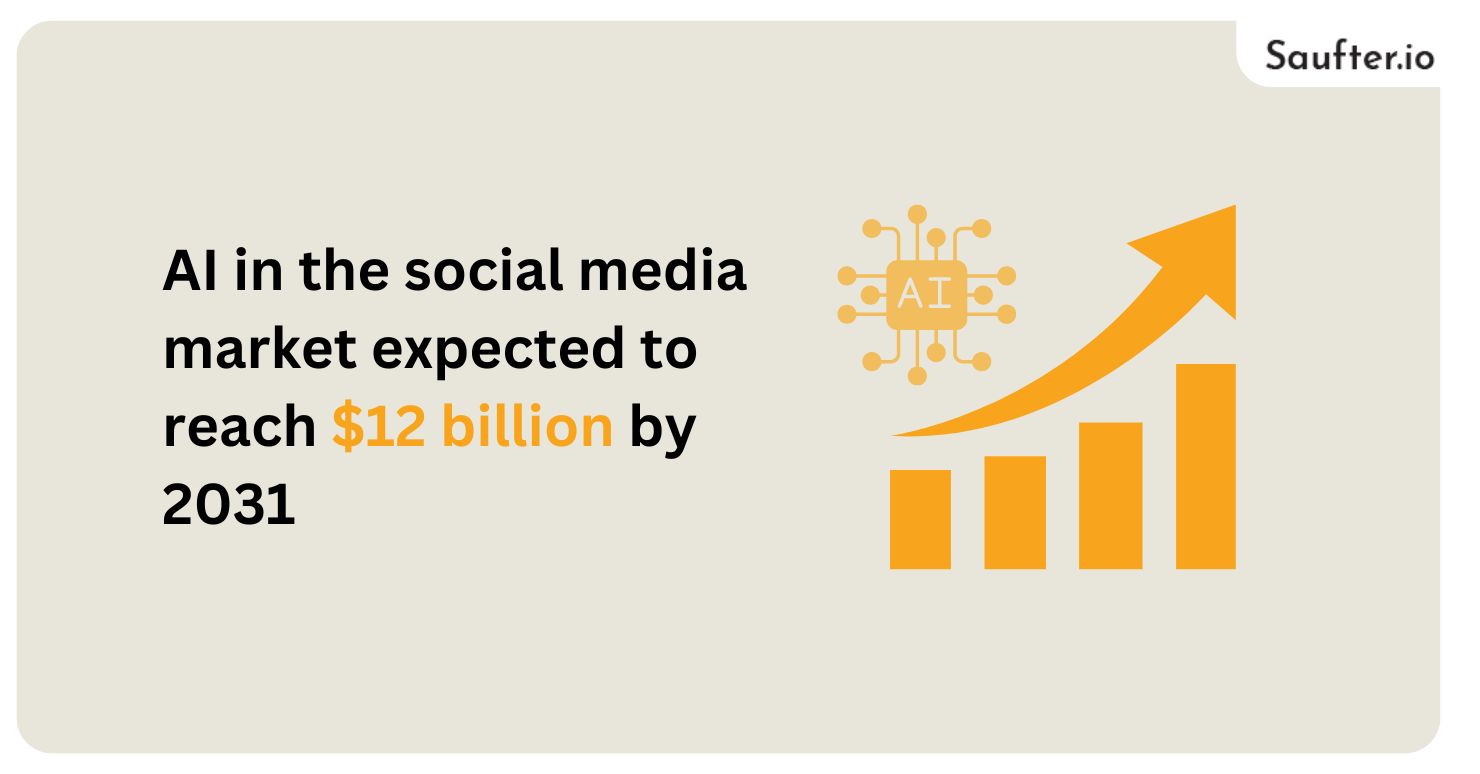
The future of social media is deeply intertwined with AI, revolutionizing user experiences through personalized content, predictive analytics, and automated interactions. These advancements not only enhance engagement but also contribute to substantial business growth. With the AI in social media market projected to reach $12 billion by 2031, the adoption of AI-driven tools will continue to expand.
Platforms like Saufter are at the forefront of this transformation, enabling businesses to automate customer engagement, optimize marketing campaigns, and drive higher conversions. As AI technology evolves, both users and brands will reap the benefits of smarter, more efficient social media strategies.
